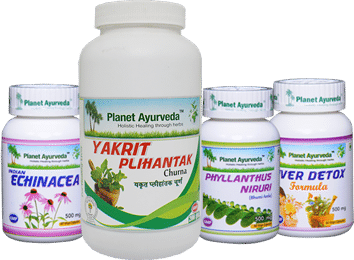Ayurvedic Treatment of Ascites – Ascites Causes, Symptoms & Diagnosis

What is Ascites?
Ascites is the collection of fluid that accumulates in the peritoneal [abdominal] cavity. Fluid is pale yellow in colour and is known as Ascetic fluid. The abdominal cavity is located below the chest which is separated by the diaphragm. Ascitic fluid can have many reservoirs like liver disease, cancers, congestive heart failure or kidney failure.
What are the Types of Ascites?
- Generally, ascites is divided into 2 types on the basis of the amount of protein present in the fluid i.e., Transudative Ascites and Exudative Ascites. Another classification has been derived on the basis of amount of albumin in the ascitic fluid compared to albumin measured in the blood [serum albumin]. It’s name is Serum Ascites Albumin Gradient or SAAG.
- Ascites which is related to portal hypertension (cirrhosis, congestive heart failure, Budd-Chiari) is generally greater than 1.1 while the Ascites caused by other reasons (malignant, pancreatitis) is lower than 1.1.
Ascites Causes
Liver cirrhosis or advanced liver disease is the most common cause of Ascites. Portal hypertension (increased pressure in the liver blood flow to the liver) is the main contributor to ascites but the exact mechanism behind this is not completely understood. The rise in portal blood pressure with decrease in albumin (a protein that is carried in the blood) may be the culprit for the formation of pressure gradient resulting in abdominal ascites. Salt and water retention is the other factor that may contribute to ascites. This further signals the kidneys to reabsorb more water as well as salt to compensate for the lost volume. Congestive heart failure, advanced kidney failure due to generalized fluid retention in the body are some other causes of ascites which are related to raised pressure gradient.
Ascites Risk Factors
Liver cirrhosis is the major cause of ascites. All the risk factors [excluding some] for developing ascites and cirrhosis are almost similar. Hepatitis B, hepatitis C and long standing alcohol abuse are other common risk factors. Malignancy, kidney diseases and congestive heart failure are some of the other potential risk factors which are related to the underlying condition i.e., Ascites.
Ascites Symptoms
If it is mild (usually less than about 100 – 400 ml in adults), there may be no symptoms associated with ascites. Increased abdominal girth and size are commonly seen with the collection of more fluid. The other most common symptoms of ascites are pain in the abdomen, discomfort and bloating.
How to Diagnose Ascites
Ascites diagnosis includes physical examination along with a detailed medical history so as to identify the possible underlying causes, since ascites is often considered a nonspecific symptom for other diseases. It can be diagnosed by physical examination by bulging flanks and fluid waves performed by doctor examining the abdomen, only if the ascites fluid is greater than 500ml. Less amount of fluid can be detected by an ultrasound of the abdomen. Ascites can be found incidentally with the help of an ultrasound or a CT scan done for the detection of other conditions. Diagnosing the underlying conditions due to which ascites has occurred is the most important part of understanding the reason for a person to develop ascites.
Herbal Remedies for Ascites by Planet Ayurveda
Planet Ayurveda provides best combination of wonderful herbal remedies for Ascites such as Liver Care Pack for ayurvedic treatment of ascites. These herbal remedies are manufactured from 100% pure and natural herbs; without the use of any chemicals, binders, fillers, colors, yeast, starch, preservatives or additives. These herbal remedies are prepared under the supervision of renowned Ayurveda experts.
DOSAGE
- Indian Echinacea – 2 capsules twice daily after meals with warm water
- Yakrit Plihantak Churna – You can boil the powder 1 teaspoonful in 400 ml water, keep it boiling until it remains 50 ml. Strain it and drink the water. Leave the residue. Do it twice daily. Make fresh every time.
- Phyllanthus Niruri – 2 capsules twice daily after meals with warm water
- Liver Detox Capsules – 2 capsules twice daily after meals with warm water
Products Description
1. Indian Echinacea
Echinacea or kalmegha is a very useful herb which is widely mentioned in various Ayurveda texts for its wonderful properties. By maintaining the immune system it supports a healthy body and in this way supports the overall health. It helps in inhibiting the inflammatory mechanism of body. Its antimicrobial properties helps in the treatment of several infections.
2. Yakrit Plihantak churna
These are the best herbs which helps in supporting and maintaining a healthy Liver. These herbs helps in the treatment of fatty liver, ascites, liver cirrhosis. This helps in the treatment of inflammation and metabolism of liver.
3. Phyllanthus niruri
Phyllanthus niruri is the best herb for maintaining liver as well as the digestive system. It is a great natural herbal supplement which is best for the maintenance of Liver, Spleen as well as other organs of abdomen. Phyllanthus niruri capsules by Planet Ayurveda are best suited for supporting Liver and its related organs.
4. Liver Detox Formula
It consists of kutki, punarnava, kalmegh, makoy, kaasni, biranjasipha, jhavuka, himsra, haritaki. These capsules helps in the treatment of liver cirrhosis which is the major cause of ascites. These capsules are made up of several herbs which acts on the liver in a natural way. The capsules are purely vegetarian, natural, and effective with no side effects. The capsules are 100% vegetarian and gelatin free.
To buy Liver Care Pack, please visit store.planetayurveda.com/products/liver-care-pack





1 thought on “Ascites”